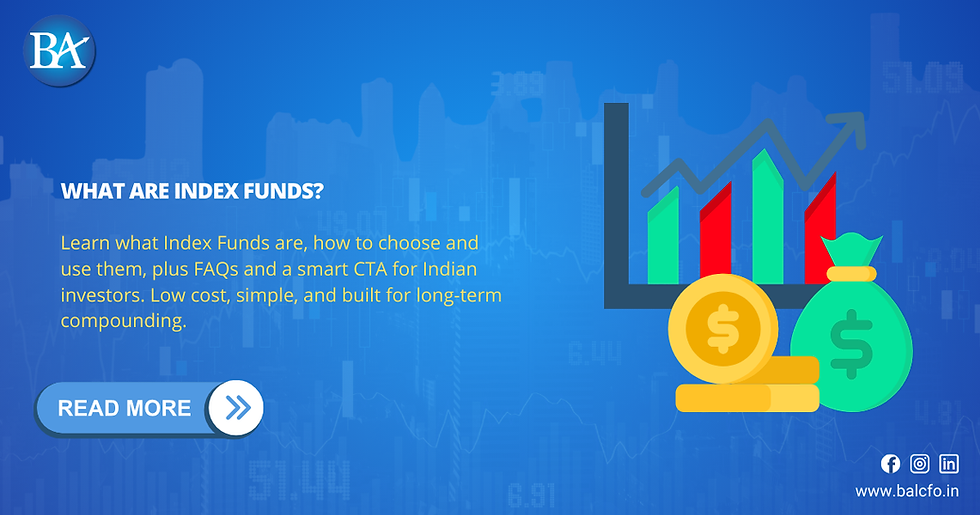What are Index Funds?
- Bell Wether
- Aug 19, 2025
- 3 min read

You hear the term everywhere, but what exactly are Index Funds and why do so many long-term investors swear by them? Think of Index Funds as autopilot investing: instead of paying a manager to pick winners, the fund simply buys the same stocks as an index and keeps costs low. With fewer moving parts, Index Funds aim to match market returns—quietly and efficiently.
Why investors love them
Low fees, transparency, and instant diversification are the big three. Because Index Funds don’t chase trends, they reduce “decision drag.” Over long horizons, that cost advantage compounds—one reason many retirement portfolios lean on Index Funds.
How index funds work
At launch, a fund selects an index and replicates it. Rebalancing happens on a schedule or when the index changes. Practical takeaway: review the expense ratio, tracking difference, and how closely the fund follows its benchmark to understand How index funds work in real life.
Choosing smart (a mini playbook)
Define your goal (wealth building vs. income).
Pick a broad benchmark (e.g., large-cap, total market).
Compare expense ratios and tracking stats.
Prefer scale and liquidity.
Automate with SIPs.If you’re researching the Best index funds in India, evaluate long-term tracking difference first; absolute return ranks can flip year to year while tracking quality is consistent. When shortlisting Index Funds, also check tax efficiency and rebalancing methodology.
Types of index funds
You’ll see market-cap, factor-based, sectoral, and debt variants. Start broad before you get fancy. Understanding the Types of index funds helps you avoid overlap; two “diversified” funds can still own mostly the same top holdings, adding cost without benefit to Index Funds buyers.
Costs and risks in plain English
Even Index Funds can drift from their benchmarks (tracking error). Liquidity in the underlying market matters, as do cash drag and rebalancing slippage. Keep an eye on these to make Index Funds work as intended over the long run.
Index funds vs mutual funds
This phrase can be confusing—index options are themselves mutual funds (or ETFs). The real contrast is with active funds that try to beat the index. In the Index funds vs mutual funds debate, the question is: do you want low-cost market results, or to pay more for a chance at outperformance?
Where to buy and who can help
You can invest directly through platforms or consult experts. If you prefer guidance, experienced mutual fund distributors in Delhi NCR can align choices with your goals and risk profile. For local support, a seasoned mutual fund distributor in Gurgaon helps with plan design, SIP setup, and rebalancing—useful if your portfolio spans many Index Funds.
A quick first-time setup
Pick one broad-market option, set a monthly SIP, and review annually. If you’re comparing the Best index funds in India, document your criteria (benchmark, cost, tracking gap) so future additions play nicely with your existing Index Funds. Knowing How index funds work makes you more confident when markets zig and zag, while a Wealth manager in Gurgaon can tailor allocations to your timeline and taxes.
What are Index Funds?
Low-cost funds that copy a market index to deliver market-like returns. Pick a broad benchmark, check fees and tracking difference, set up SIPs, and stay invested.
Why Choose BellWether for Index Fund Investing
Building a passive core and wondering how to size equity vs. debt, or which benchmarks best fit your timeline? BellWether can design a clean, low-cost allocation, shortlist funds with tight tracking, and set disciplined SIPs—so your plan works even when headlines don’t.
FAQs (fresh, simple, and different from the blog)
1) Do I need multiple index funds or just one?
One broad fund can cover a lot. Add more only if they target different segments (like large-cap plus mid-cap) and genuinely improve diversification rather than duplicating holdings.
2) Should I stop SIPs when markets fall?
Usually no. Falling prices mean you buy more units for the same money. Pausing often locks in nerves, not gains. Revisit goals annually instead of reacting weekly.
3) What’s a reasonable review checklist? Once a year, check expense ratio changes, tracking difference, index methodology updates, and whether your asset mix still matches your goal and risk tolerance.
4) Are ETFs better than index mutual funds?
ETFs trade intraday and may have lower expense ratios, but require a demat and incur bid-ask spreads. Index mutual funds offer easy SIPs and NAV-based pricing. Choose what fits your workflow.
5) How do I avoid overlap across funds?
Look at each fund’s top holdings and sector weights. If two funds hold the same top names in similar weights, you’re paying twice for the same exposure.




Comments